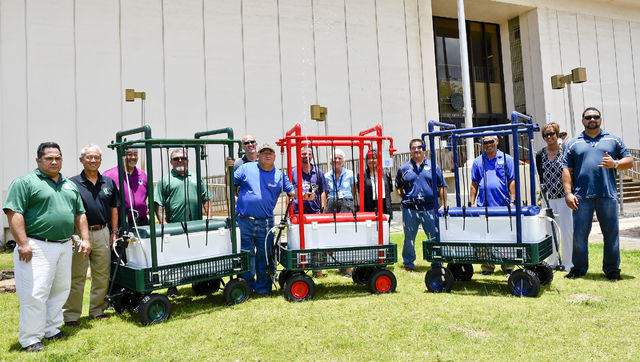LIHUE — Department of Education personnel were joined by the athletic directors from the three public high schools in accepting custom-made hydration stations for the schools’ athletic programs. “On behalf of the Department of Water, we are pleased to donate
LIHUE — Department of Education personnel were joined by the athletic directors from the three public high schools in accepting custom-made hydration stations for the schools’ athletic programs.
“On behalf of the Department of Water, we are pleased to donate these custom hydration stations that will support student athletes, faculty, coaches, and community volunteers,” said Kirk Saiki, DOW manager and chief engineer. “Freddy Levinthol, the DOW waterworks inspector, approached me with the idea about a month ago, and I was immediately on board. He finished constructing all three stations just in time for the start of preseason football.”
The waterworks inspector is no stranger to the needs within high school athletic programs because he has helped with the Kapaa High School football team for nearly seven years, serving on the coaching staff during the time Keli‘i Morgado served as its head coach.
“When our KIF football games were switched to Saturday afternoons from Friday nights, hydration became a critical issue,” said Morgado, currently the Kauai High School athletic director. “I showed Freddy what types of hydration stations were being sold on the Internet for athletic teams. These units contain expensive marine pumps and rechargeable batteries, not to mention high shipping costs to Hawaii. Freddy used his plumbing expertise to come up with a hydration station that is far superior to anything you can find online. All we had to do was fill the cooler with ice, hook it up to the water hose down at our field. Hydrating our athletes became so much easier because of the ‘Levinthol Hydration Station.’”
Prior to constucting the stations for each of the public high schools, Levinthol brought it out to the football clinic last week where it piqued the interest of University of Hawaii football coach Nick Rolovich who got a walk-through by Levinthol ahead of the clinic.
Labeled “the Octopus” by Levinthol, the hydration station was further tested at the Mayor-a-thon Saturday.
Tamaoka estimates each unit to cost about $1,000 each to create using items from local hardware stores.
“The station works through a water spigot connection,” she said. “When water is turned on, it first moves through copper coils inside of a water cooler situated on top of a mobile garden gart. Ice is piled on top of the coils, cooling the water as it is dispensed through eight different sprays, and a pair of outlets where water bottles can be filled. Water comes out ice cold using this pressurized system, and does not need electricity, or batteries to operate.”
Levinthol said due to the use of parts obtained locally, maintenance is also facilitated.
“And, it has no hose taste,” he said.




